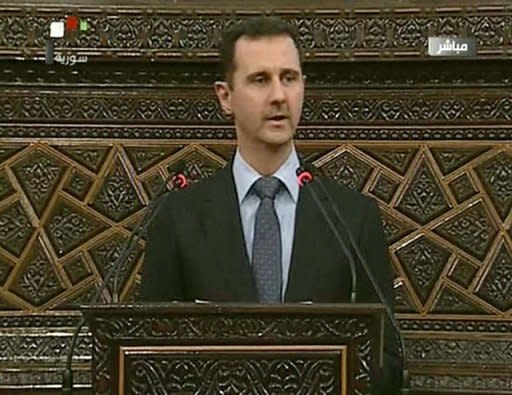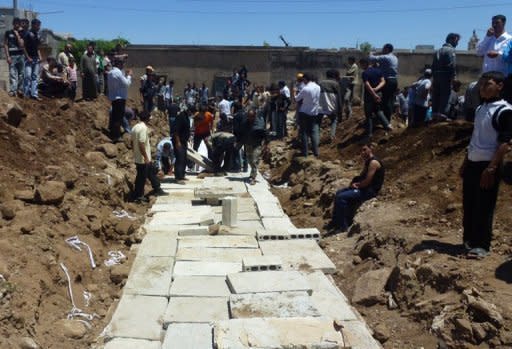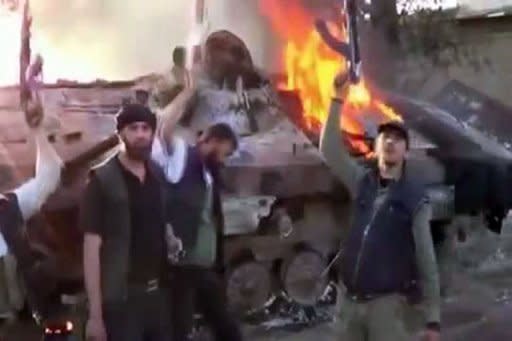Defiant Assad rejects role in Houla massacre
President Bashar al-Assad on Sunday dismissed allegations that his government had a hand in the Houla massacre and accused foreign-backed forces of plotting to destroy Syria. At least 39 people were reported killed across the country as troops clashed with rebels, the Syrian Observatory for Human Rights reported. On the political front, the European Union and the United States joined forces to pile pressure on Syrian ally Russia to change its stance on Damascus, but President Vladimir Putin refused to budge. In a speech to parliament that lasted more than an hour, Assad said that even "monsters" were incapable of carrying out massacres such as last month's killings near the central Syrian town of Houla. His reaction came after Arab ministers urged the United Nations to act to stop the bloodshed, and France raised the prospect of military action against Damascus under a UN mandate. "What happened in Houla and elsewhere are brutal massacres which even monsters would not have carried out," Assad said of the May 25 killing of 108 people, including 49 children. "The masks have fallen and the international role in the Syrian events is now obvious," he said in his first address to the assembly since a May 7 parliamentary election. The polls were the perfect response "to the criminal killers and those who finance them," Assad said, stressing that his regime was determined to push through reforms but not at the expense of security. "We are not facing a political problem but a project to destroy the country," he said, adding there would be "no dialogue" with opposition groups which "seek foreign intervention." An official of the exiled opposition Syrian National Council condemned the address. "Assad's speech was a declaration of the continuation of the bloody solution and the suppression of the revolution at any cost," Samir Nashar, a member of the SNC executive office, told AFP. Putin, meanwhile, fended off a coordinated Western push to back further action on Syria as he hosted a private dinner for EU chiefs in Saint Petersburg. "The only way out of the Syria crisis... involves a cessation of violence and consistent support for the plan of (mediator Kofi) Annan," Russia's foreign ministry quoted Putin as saying. "Russia will continue supporting this position and calls on other states to do the same." US Secretary of State Hillary Clinton said on Sunday she "made it very clear" to her Russian counterpart Sergei Lavrov at the weekend that the focus was shifting to a political transition in Syria. "Assad's departure does not have to be a precondition but it should be an outcome, so the people of Syria have a chance to express themselves," she told reporters in Stockholm. The European Union plans to deliver a similar message to Putin during formal meetings on Monday, diplomats said. French Defence Minister Jean-Yves Le Drian also urged Russia to drop its backing for Assad's regime and said in Singapore on Sunday that France "has not excluded military intervention" in Syria. Saudi Foreign Minister Saud al-Faisal accused Assad of "manoeuvring" to gain time, at a joint news conference with UN chief Ban Ki-moon in Jeddah. "Every initiative has been accepted by the Syrian regime and was not implemented. This is a way used by the regime to gain time," he said. Annan "will present his report in a few weeks... It must be clear, straightforward, precise and transparent," Prince Saud said. "We hope the United Nations takes a firm stance." Ban called the situation in Syria "troubling" and again urged Damascus to "abide to the Annan plan," adding that "all violence must stop in all its forms." Pro-democracy activists responding to Assad's speech called for anti-regime demonstrations on their Facebook page "Syrian Revolution 2011." "Let's all go, young and old, to meet the executioner, the murderer of children. Make yourself angry and intensify the anger in yourself and on the ground by all means." At least 39 people were killed across Syria on Sunday, the Syrian Observatory said. Fighting was reported in Damascus province, the northwestern province of Idlib and near the northern city of Aleppo, it said. The Observatory listed the fatalities as 19 soldiers, 12 civilians, five rebels and three deserters. One civilian victim was activist and doctor Adnan Wehbeh, who was shot dead at his clinic, it said, blaming security forces. On Saturday, 89 people were killed, among them 57 soldiers, the largest number of casualties the military has suffered in a single day since the uprising broke out in March 2011, the watchdog said. The violence has spilled over into Lebanon, with clashes between pro- and anti-Syrian regime gunmen in the northern city of Tripoli leaving 14 people dead and 48 wounded since Saturday, a security official said. The Observatory says as many as 2,400 of the more than 13,500 people killed since the uprising began have died since a putative UN-backed ceasefire began on April 12. Days later unarmed UN observers began deploying in Syria.






